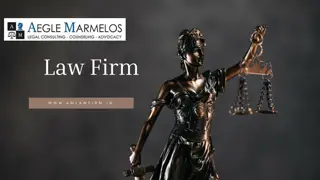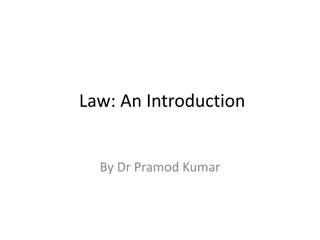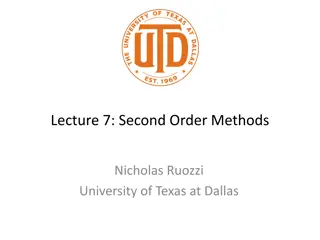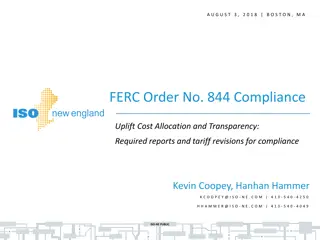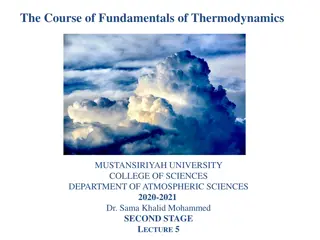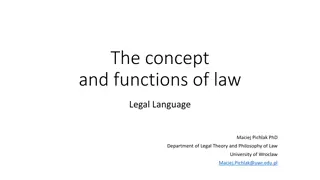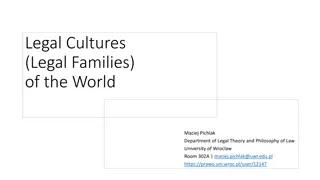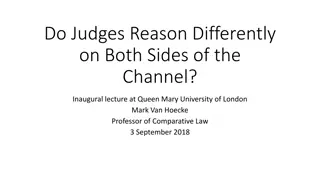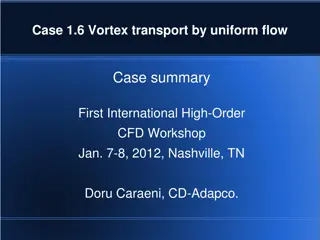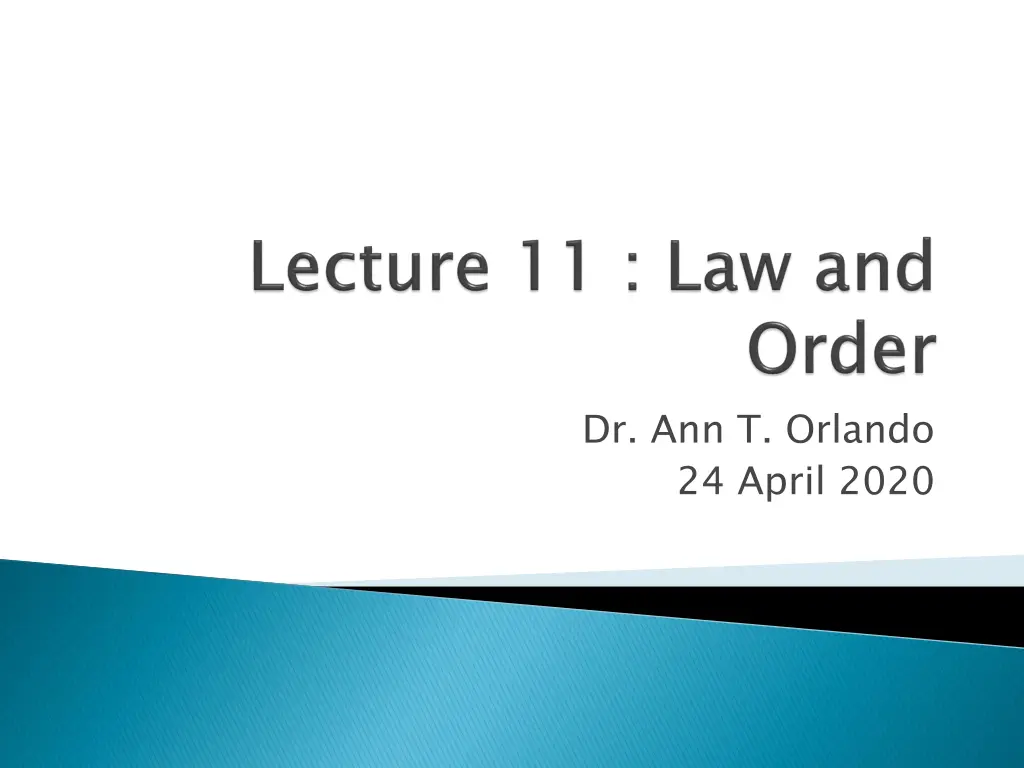
Understanding Law and Order in Philosophy and Early Christianity
Explore the concept of law and order in philosophy and early Christian views, delving into teachings from philosophers like Aristotle and the perspectives of figures like Paul in the context of civic laws, virtues, and divine order in the cosmos.
Download Presentation

Please find below an Image/Link to download the presentation.
The content on the website is provided AS IS for your information and personal use only. It may not be sold, licensed, or shared on other websites without obtaining consent from the author. If you encounter any issues during the download, it is possible that the publisher has removed the file from their server.
You are allowed to download the files provided on this website for personal or commercial use, subject to the condition that they are used lawfully. All files are the property of their respective owners.
The content on the website is provided AS IS for your information and personal use only. It may not be sold, licensed, or shared on other websites without obtaining consent from the author.
E N D
Presentation Transcript
Dr. Ann T. Orlando 24 April 2020
Review of Law and Order among philosopher Early Christian view of civic law Background from prior Augustine readings How to treat enemies Just war Outsiders in a Christian society: Pagans, Donatists and Jews Assignments
Aristotle taught that the cosmos (universe) was perfectly structured (ordered) Part of its perfection was that the cosmos is eternal For Stoics, not only is the cosmos perfectly ordered, but it is as an entity made alive by the working of the divine reason throughout it Plotinus suggests that the One has ordered all things in the cosmos toward the good and the beautiful, that is toward the One itself Order is inherent in nature NB Only the Epicureans do not believe the cosmos is an ordered place; Rather cosmos is composed of random atoms, undirected by any god(s)
Law follows from an understanding of proper order in cosmos And especially applied to human behavior For Plato, law is based on objective knowledge of right and wrong; and obedience to law is righteousness Thus Socrates is righteous in being put to death under a law that has been manipulated against him For both Plato and Aristotle the man of virtue is the best giver and enforcer of law For Plato, Aristotle and Plotinus, the truly virtuous enlightened king is the law NB For Epicureans, there is no proper unified law, just human agreements or norms
Paul in Rom 13 encourages Christians to follow the local laws Obey civic authorities Pay taxes Due so because salvation is nearer to us now than when we first became believers During time of persecution, apologists tried to demonstrate the Christians were good citizens Justin Martyr First Apology
Constantine as another apostle Council of Nicaea Social and Political Sunday as a day of rest Constantinople as New Rome Legal Bishops could act as judges in their diocese (Roman administrative province) Crucifixion prohibited No branding of prisoners because mars image of God Economic Christian could not charge another Christian interest on a loan (sin of usury) Christian clergy given tax relief Churches could receive legacies Theodosius declares orthodox Christianity the official religion of the Empire Athanasius 6
Man is made social (On Goods of Marriage) Do not expect to find happiness in this changing temporal world (On Happiness) Justice should be based on the double command of love of God and neighbor (De Trinitate Book XIII) After the Fall we as individuals, and thus society, are disordered (see almost any work against the Pelagians) Politics is necessary in our fallen, disordered, state (CoG) Wars are inevitable in our disordered state, beginning with Cain and Abel (CoG XV) Secular justice will always be imperfect (CoG XIX) But the Christian should try to make his enemy his brother (Homily 7 on First Epistle on John) The application of Augustine s political thought is often found in his letters to civic officials.
We have nearly 300 letters by/to Augustine, 249 written by Augustine 49 written to Augustine 9 written to/by African bishops at the time All of these letters can be found in WSA II/1-4 Letters were the only means of communication among friends, and sometimes, adversaries Some close friends of Augustine were only known to each other through their correspondence, such as Paulinus Same is true of Jerome
Letter 153 To Macedonius Macedonius had written wanting to know why bishops interfere with judicial proceedings, especially on behalf of the guilty Augustine s reply is to encourage Macedonius to be a just judge, but also a merciful one And remember that we are all sinners Special care should be taken toward the criminal who seems to be genuinely repentant and who has made restitution Similar themes are found in Letter 10* to Alypius, against slave-trading and how slave traders are to be treated
Augustine lived in a very violent time Christian emperors seemed just as war-prone as their earlier pagan counterparts Civil wars, often pitting one Christian group against another Tax revolts External threats from Persians and especially the German tribes Within Empire violent conflicts among Christians: Arians, Donatists, Manicheans How to treat other enemies within: pagans and Jews
If at all possible, war should be avoided through peaceful resolutions it is a mark of greater glory to slay wars themselves by the word rather than human beings by the sword, and to win and obtain peace by peace, not by war. (Letter 229 to Count Darius) But sometimes war cannot be avoided But it should be motivated by peace Conducted in the right way And at the command of a duly appointed authority
Boniface was a Christian general leading an army against the barbarian invasion Probably written 415-420 One of earliest examples of Christian support for military Aim of war should be peace War is part of our imperfect world Boniface, though a soldier, should live as a Christian as he defends society 12
Theodosius made Christianity the official religion and outlawed public pagan rituals in 380 But there were many pagans in positions of civic importance Example: Letters 90 and 91 from/to Nectarius, a pagan official, and Augustine Nectarius, in Letter 90 to Augustine, argues that pagans love their city (Calama) and should not be punished for observing their rites in honor of their city Further bishops should not seek the civil punishment of pagans who attack Christians since bishops should only be worried about salvation of souls
Establishes common ground by concurring that one should love one s city But he hopes Nectarius will seek the heavenly city A city is peaceful when all citizens engage in right conduct Bishops have a duty to correct and punish those who have injured others But the purpose should be to bring them to salvation
Augustine still forms the starting point for any discussion of just war Jus ad bellum; that is the legitimate reasons to go to war Jus in bello; that is the just way to wage war Systematized by Aquinas See ST II II Q40
Perhaps preached just after sack of Rome in 410 (see last paragraph #7) Note discussion of three ages of law: before law; under law; under grace (#3) Interesting discussion of Look, Seek, Find oneself in #5
Preached on feast day of St. Lawrence the Martyr St. Lawrence was universally venerated; likely there was a shrine dedicated to him in Hippo Note discussion of role of populace, civil authorities and bishops in dealing with criminals Also see brief discussion on duty of soldiers
Letter 153 To Macedonius Letter 229 To Count Darius Letter 189 To Boniface Letter 91 To Nectarius Sermon 72 and 302 in Essential Sermons of St. Augustine
Lamb, Michael. Augustine and Republican Liberty: Contextualizing Coercion, Augustinian Studies 48:1-2(2017) 119-159. Ratzinger, Joseph. The Unity of the Nations, A Vision of the Church Fathers. Trans. Boniface Ramsey. Washington D.C.: Catholic University Press, 2015. Bruno, Michael. Disputing the Seculum Robert Marcus, John Milbank, and Contemporary Augustinian Interpreters, in Modern Interpretations of Augustine s Political Ideas. Minnesota: Augsburg Fortress, 2014.

